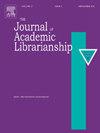运用行为经济学在美国高校图书馆员与留学生之间建立社会资本
IF 2.3
3区 管理学
Q2 INFORMATION SCIENCE & LIBRARY SCIENCE
引用次数: 0
摘要
本文首次将行为经济学应用于高校图书馆的社会资本研究。具体而言,本文运用了行为经济学的几种认知偏差来增加图书馆员与留学生之间的社会资本。本文旨在提供一种改善国际学生图书馆体验的方法,从而提高他们的学术成就。一些认知偏差被使用,如社会证明偏差、锚定偏差、损失厌恶、互惠和框架偏差。本文章由计算机程序翻译,如有差异,请以英文原文为准。
Using behavioral economics to build social capital between academic librarians and international students in the US
This paper is the first to apply behavioral economics to social capital for academic libraries. Specifically, the paper employs several cognitive biases from behavioral economics to increase the social capital between librarians and international students. The paper does so to provide a way to improve the library experience of international students and thereby improve their academic success. Several cognitive biases are used such as the social proof bias, anchoring bias, loss aversion, reciprocity, and framing bias.
求助全文
通过发布文献求助,成功后即可免费获取论文全文。
去求助
来源期刊

Journal of Academic Librarianship
INFORMATION SCIENCE & LIBRARY SCIENCE-
CiteScore
5.30
自引率
15.40%
发文量
120
审稿时长
29 days
期刊介绍:
The Journal of Academic Librarianship, an international and refereed journal, publishes articles that focus on problems and issues germane to college and university libraries. JAL provides a forum for authors to present research findings and, where applicable, their practical applications and significance; analyze policies, practices, issues, and trends; speculate about the future of academic librarianship; present analytical bibliographic essays and philosophical treatises. JAL also brings to the attention of its readers information about hundreds of new and recently published books in library and information science, management, scholarly communication, and higher education. JAL, in addition, covers management and discipline-based software and information policy developments.
 求助内容:
求助内容: 应助结果提醒方式:
应助结果提醒方式:


